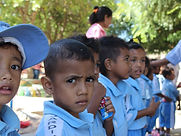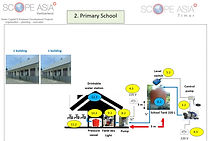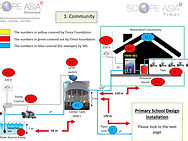
Already executed Projects
Building Sustainable Futures: Innovative Projects by Barbara Elisabeth Maria Lietz
Discover the projects Barbara Elisabeth Maria Lietz has implemented in India, Indonesia and Timor-Leste, from small and very large water treatment plants to community-based solutions for waste management and organic farming. Discover how their innovative approach to development has helped build a sustainable future.
However, the projects featured are just examples of the many innovations and implementations she has been able to help shape or be a part of. Barbara's extensive experience in sustainable development has allowed her to implement many things in different regions and populations. Many of these projects were first tested in one setting and then successfully continued in various other locations.
Government of Timor Leste
Timor Leste
Development of a new Hospital to provide free care for the Timorese people
The Bairro Pite Hospital project in Timor-Leste was an initiative aimed at improving healthcare access and providing free care for the Timorese people. The project envisioned the development of a new policlinic/specialist hospital that would cater to the healthcare needs of the local community. The proposed hospital would provide specialized medical care and treatment to patients suffering from various illnesses and medical conditions.
The project aligned with the vision of Dr. Chris Fenton and Dr. Dan, who were both committed to improving healthcare access in the region. The team behind the project believed that by developing a new healthcare facility, they could create an environment where patients could receive the care they needed without the burden of financial constraints.
Barbara's involvement in the project involved providing support and guidance on various aspects of the project, including developing a sustainable business model, identifying potential sources of funding, and implementing best practices in healthcare management.
The Bairro Pite Hospital project was an excellent example of a public-private partnership aimed at improving the lives of people in underserved communities. With the support of Barbara, the project was well-positioned to achieve its goals and make a significant impact on the lives of people in Timor-Leste.


.jpeg)
Government of East Timor
Timor Leste
Empowering Entrepreneurs in Timor Leste through Water Production Facilities
The project to develop a new business for local production of fresh drinking water using the "BaginBox" packing system in countries like Timor Leste was successfully implemented by Barbara. The project received funding from the Government of Timor Leste and aimed to provide access to safe and clean drinking water even in emergency situations, by getting rid of the traditional water dispensers and introducing the new "BaginBox" system. The project involved financing the water production, training trainers in technical fields, implementing a new hygiene concept, and developing a sustainable entrepreneurship concept. To achieve these goals, the project built three water production areas and trained teams in technical fields.
The "BaginBox" water filter, which was developed for this project by Barbara and other experts, is a unique, flexible, and portable packing system that can produce safe and clean drinking water by removing all types of surface water contaminants, including bacteria, parasites, protozoa, drug residues, heavy metals, and chemicals. The project received recognition and funding from the Ernst and Young event called Entrepreneur of the Year award.
The project was carried out in collaboration with Swiss firm Trunz Water Systems, which provided training to technicians and those responsible for operating the equipment. The project's success in providing safe drinking water in Timor Leste also made it a pilot project for other countries. The innovative approach used in this project is a way of bringing water to people without bringing diseases.
Additionally, the same principles were used to produce coconut water without preservatives afterward, extending the benefits of the project beyond safe drinking water to other products. Overall, the project has made a significant contribution to improving access to safe and clean drinking water in Timor Leste and can serve as a model for similar initiatives in other underserved communities.



Government of Bali/Indonesia & Udayana University
Bali | Indonesia
Waste to Wealth: Bali's Community-based Sustainable Solutions
Barbara successfully led a pioneering project in Bali that transformed waste management into a community-based organic farming opportunity. The project focused on providing sustainable solutions for organic waste management to locals, businesses, and hotels by converting waste into liquid bio-fertilizer and biogas. The Smart Biobox, a flagship product of the project, was an innovative shredding and plastic-reusing equipment that efficiently converted organic waste into liquid biofertilizer and biogas. Additionally, the project included a solar-powered water purification system that turned any water source into high-quality drinking water without toxic chemicals.
By partnering with communities and international organisations, Barbara had access to high-quality and eco-friendly waste management solutions and sustainable farming systems. The project was a collaboration between the Government of Bali, Udayana University, Biomatch Germany for waste management, and Woima for waste-to-energy production.
The waste management concept was community-based, with a centralized location for waste selection and a house for collecting organic fertilizer, biogas, and clean drinking water. Plastic waste was also upcycled to produce household items. This long-term project showcased small but impactful innovations that brought significant positive change to the communities involved. The project generated a learning experience that raised awareness of sustainable waste management practices and was later replicated by Udayana University in Korea.



Government of Timor Leste & PH Zurich
Timor Leste
Education for Empowerment: Teach the Teachers
The government of Timor-Leste recognizes the importance of education and training in improving the lives of its people and promoting economic development. To achieve this goal, the President of Oe-Cusse, Dr. Mari Alkatiri, partnered with the Timor Foundation and the Zurich University of Teacher Education (PH Zurich) to develop a strong education system with a focus on vocational training.
The Teach the Teacher Program is the first step in this partnership, which aims to train teachers in the areas of education, educational psychology, didactics, and methods. This program provides teachers with the necessary tools to prepare students for a self-reliant work in professional life and promote a market-oriented society.
In the medium term, the goal is to train a considerable number of independent, self-responsible people in different regions in hospitality and tourism, construction, agriculture, forestry, and fisheries. The objective is to implement sustainable and appropriate international standards in Oe-Cusse by setting up a model school. This school will include all grade levels and focus on developing an attitude of student-centered teaching and learning, networked thinking, and autonomous action.
The benefits of this project are numerous and far-reaching. The trained teachers will acquire high-class training and professional competence, and their students will receive training that promotes self-reliance and autonomy. The project also allows the control authority to approach the objectives of the strategic plan in the medium to long term, and ZEESM TL Oe-Cusse can showcase its innovative character and promote the training quality in the country and the whole region.
The ultimate goal of this project is to empower the people of Timor-Leste with education and training that gives them the knowledge and skills to lead healthy, productive lives and actively contribute to the nation's development. By building a strong education system with a focus on vocational training, Timor-Leste can create a brighter and more prosperous future for its people.



Government of Timor Leste
Timor Leste
Agro-Forestry Plantation
This project aimed at introducing innovative and sustainable cocoa production in an agro-forestry intercropping system in Timor-Leste. The project involved the establishment of a cocoa plantation and factory managed in an organically certified approach. The aim was to offer income possibilities for farmers, who had started cocoa production five years ago but could not benefit fully from the newly introduced cocoa crop due to lack of appropriate markets.
The project involved the training and engagement of local technical advisors who worked closely with local cocoa farmers in cocoa production, shade management, and intercropping in a sustainable agro-forestry system. The project aimed to establish more than 20 hectares of sustainably managed cocoa plantation under an agro-forestry system. In cooperation with local families, land was acquired to establish at least 20 hectares of cocoa plantation.
The project was successful in introducing innovative and sustainable cocoa production to Timor-Leste. It offered income possibilities for farmers and helped improve the productivity of traditional food crops and industrial crops. The project contributed to boosting family income and motivation of young local school leavers to venture into agricultural production and increase productivity, and improved livelihood and food security in the short and medium term in Timor-Leste.































.jpg)












.jpeg)
.jpeg)









.jpeg)






